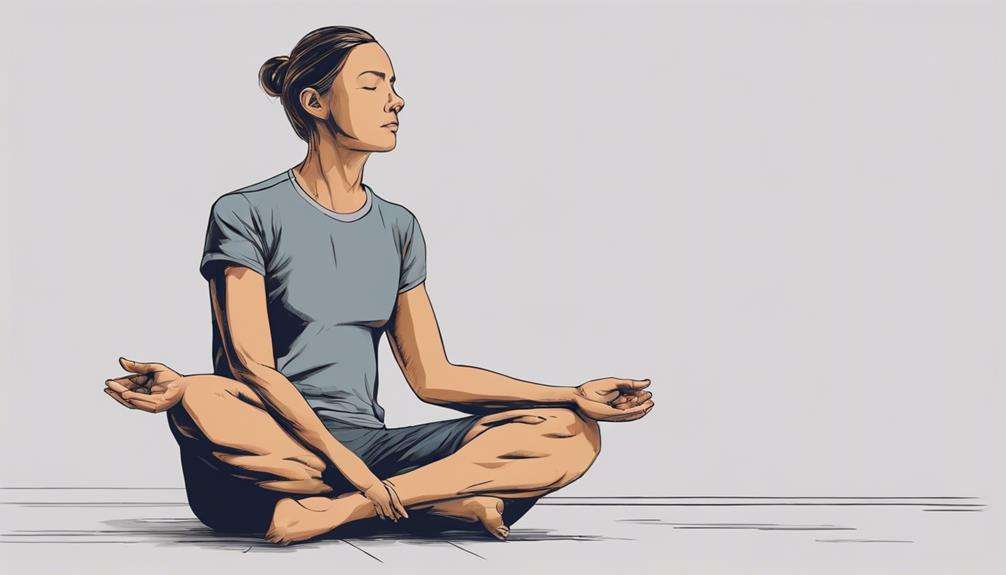Imagine your mind as a turbulent ocean, waves crashing chaotically against the shore. Now, picture meditation as the gentle breeze that gradually calms the waters, bringing stillness and clarity to the surface.
Curious about how this simple practice can transform your inner landscape and provide a sanctuary amidst life's storms?
Key Takeaways
- Meditation lowers stress, promotes relaxation, and regulates emotions for inner peace.
- Enhances focus, concentration, and sleep quality, fostering emotional well-being.
- Mindfulness practices reduce anxiety, enhance mental clarity, and cultivate calmness.
- Regular meditation fosters emotional balance, tranquility, and a profound sense of well-being.
Benefits of Meditation for Inner Peace
By practicing meditation, you can experience a multitude of benefits that contribute to your inner peace. Meditation is a critical tool for lowering stress and anxiety levels by reducing cortisol, the stress hormone. As you meditate, you create a sense of calm within yourself, promoting relaxation and emotional well-being. This practice helps you regulate your emotions, leading to a more vital and peaceful state of mind.
Additionally, through meditation, you can enhance your focus and concentration. By training your mind to stay in the present moment, you develop mental clarity and the ability to direct your attention where you want it to go. This newfound focus not only benefits your daily tasks but also aids in managing feelings of anxiety.
Furthermore, meditation plays a pivotal role in improving sleep quality. By promoting relaxation and cultivating a calm mind, you can create a peaceful bedtime routine that supports restful sleep. Embracing meditation as part of your daily routine can lead to a significant enhancement in your overall well-being and inner peace.
Techniques for Enhanced Relaxation
To enhance your relaxation and promote a sense of calm, consider incorporating various techniques such as deep breathing, progressive muscle relaxation, visualization, body scan meditation, and mindful walking into your daily routine.
Deep breathing techniques can help calm your mind and body swiftly, while progressive muscle relaxation involves a systematic tensing and releasing of muscle groups, aiding in overall relaxation.
Visualization techniques allow you to create peaceful mental images, helping to reduce stress and promote inner peace. Body scan meditation is a practice where you focus on each part of your body, releasing tension and promoting a deep sense of relaxation.
Finally, mindful walking involves paying attention to each step and breath, grounding you in the present moment and fostering a sense of calm. Incorporating these techniques into your routine can significantly contribute to your overall well-being and relaxation.
- Deep Breathing: Instantly calms your mind and body.
- Visualization: Helps create peaceful mental images for relaxation.
- Body Scan Meditation: Releases tension by focusing on each body part.
Mindfulness Practices for Calmness

Consider how mindfulness practices can further enhance your sense of calmness and inner peace by focusing on the present moment without judgment. Mindfulness meditation, a key component of these practices, allows you to cultivate a state of relaxation while promoting emotional well-being and mental clarity. By engaging in mindfulness techniques, you can effectively reduce stress and anxiety levels, leading to a more serene daily life.
The beauty of mindfulness lies in its simplicity and accessibility for everyone. You can seamlessly integrate mindfulness practices into your routine, whether it's taking a few minutes each day to focus on your breath or incorporating mindful movements like yoga or tai chi. These small yet powerful moments of presence and non-judgment can have profound effects on your overall well-being.
Embrace the opportunity to bring mindfulness into your life, allowing yourself the gift of calmness and inner peace amidst the hustle and bustle of daily challenges. Start today and witness the transformative impact of being fully present in the now.
Meditation for Stress Relief
For effective stress relief, incorporating meditation into your daily routine can greatly improve your overall well-being. Meditation helps reduce stress by lowering cortisol levels and alleviating anxiety. It also promotes relaxation and enhances emotional well-being by regulating emotions and fostering a sense of calm.
Additionally, studies have shown that regular meditation practice can have a positive impact on your physical health, such as lowering blood pressure and reducing the risk of heart disease. By focusing on your breath and being present in the moment, meditation can improve your sleep quality, mental clarity, and concentration.
Take a few moments each day to sit quietly, close your eyes, and center your attention on your breath. Allow the practice of meditation to guide you towards a more peaceful and balanced state of mind.
Inner Peace Through Meditation

If you're seeking a path to inner peace, meditation provides a powerful tool to calm your mind and nurture emotional balance. By taking the time to sit quietly, focus on your breath, and let go of the chaos around you, meditation helps us feel a sense of calm and tranquility within. As you inhale and exhale, you begin to notice your thoughts without judgment, allowing them to pass by like clouds in the sky. This practice of mindfulness can help us to find our inner selves and connect with a deeper sense of peace.
The Benefits of Meditation extend beyond just relaxation; it can also lead to a profound sense of emotional well-being and balance. Making meditation a regular part of your routine can cultivate feelings of love and kindness towards yourself and others. So, take a few moments each day to sit quietly, breathe deeply, and allow yourself to find inner peace through the simple yet powerful practice of meditation.
Frequently Asked Questions
What Are the Benefits of Meditation for Inner Peace?
Meditation offers stress relief, emotional balance, mindfulness practice, increased focus, relaxation techniques, mental clarity, self-awareness, positive energy, spiritual growth, and a calm mind. It supports your journey towards inner peace and overall well-being.
Why Does Meditation Give Peace?
When you meditate, your mind calms down as you focus on the present. This mindful breathing and stillness practice trigger your body's relaxation response, promoting emotional balance and tranquil thoughts, leading to a serene and peaceful retreat.
How Do You Meditate to Find Inner Peace?
To find inner peace through meditation, start with deep breathing and guided visualization. Try mindful walking or a body scan. Add loving kindness, make it a morning ritual. Include nature immersion, yoga, candle gazing, or gratitude journaling for relaxation.
What Is the Significance of Inner Peace?
Feeling the tranquil calm within, mindfulness practice nurtures emotional balance, mental clarity, and self-awareness. Stress reduces as relaxation techniques guide you towards spiritual growth and healing. Cultivate a calm mind for inner peace.
Conclusion
To sum up, meditating for inner peace and relaxation can truly transform your well-being. Did you know that a study published in JAMA Internal Medicine found that mindfulness meditation can reduce symptoms of anxiety and depression by up to 10-20%?
By incorporating meditation into your daily routine, you can experience a calmer mind, improved focus, and a greater sense of tranquility in your life. Remember, taking time for yourself is essential for your overall happiness and peace of mind.
Keep meditating and stay calm.






